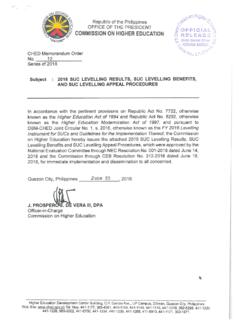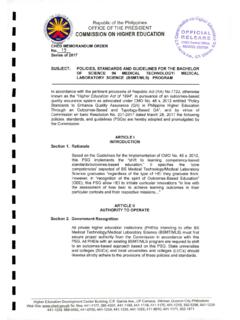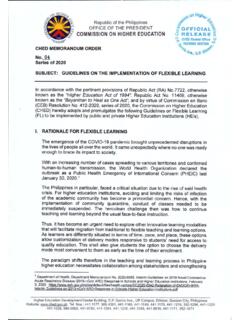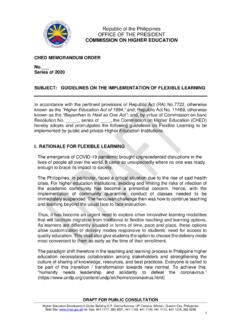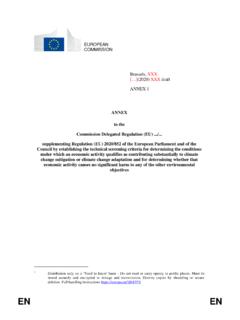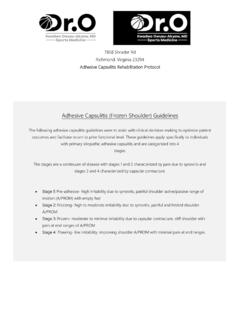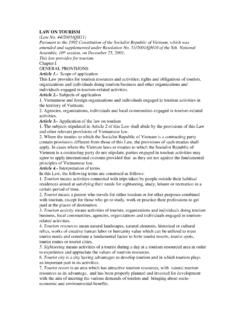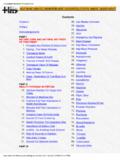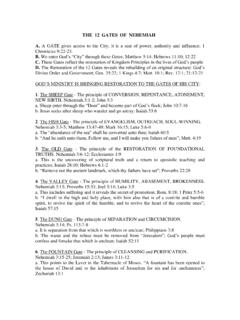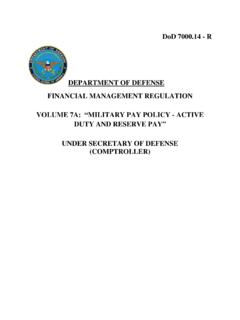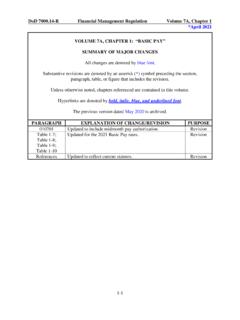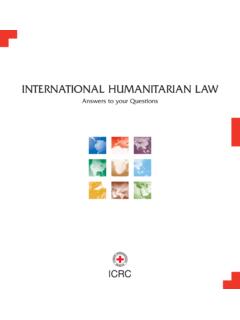Transcription of CHED MEMORANDUM ORDER (CMO)
1 CHED MEMORANDUM ORDER (CMO) No. 5 Series of 2008 SUBJECT: POLICIES AND STANDARDS FOR BACHELOR OF SCIENCE IN NURSING (BSN) PROGRAM In accordance with pertinent provisions of Republic Act (RA) No. 7722, otherwise known as the Higher Education Act of 1994 and pursuant to Commission en Banc Resolution No. 93-2008 dated March 10, 2008 and for the purpose of rationalizing Nursing Education in the country in ORDER to provide relevant and quality health services locally and internationally, the following policies and standards for Bachelor of Science in Nursing (BSN) program are hereby adopted and promulgated by the Commission. ARTICLE I INTRODUCTION Section 1. A person is a unique bio-psycho-socio-cultural and spiritual being, always in constant interaction with the environment. These interactions affect individuals, families, population groups and societal health status.
2 The nurse assumes the caring role in the promotion of health, prevention of diseases, restoration of health, alleviation of suffering and, when recovery is not possible, in assisting patients towards peaceful death. The nurse collaborates with other members of the health team and other sectors to achieve quality healthcare. Moreover, the nurse works with the individuals, families, population groups, community and society in ensuring active participation in the delivery of holistic healthcare. Within the context of the Philippine society, nursing education with caring as its foundation, subscribes to the following core values which are vital components in the development of a professional nurse and are emphasized in the BSN program: Love of God Caring as the core of nursing a. Compassion b. Competence c. Confidence d.
3 Conscience e. Commitment (commitment to a culture of excellence, discipline, integrity and professionalism) 1 Love of People a. Respect for the dignity of each person regardless of creed, color, gender and political affiliation. Love of Country a. Patriotism (Civic duty, social responsibility and good governance) b. Preservation and enrichment of the environment and culture heritage A strong liberal arts and sciences education with a transdisciplinary approach, enhances this belief. The BSN program therefore, aims to prepare a nurse who, upon completion of the program, demonstrates beginning professional competencies and shall continue to assume responsibility for professional development and utilizes research findings in the practice of the profession. The following are the Key Areas of Responsibility for which the nurse should demonstrate competence: 1.
4 2. 3. 4. 5. 6. 7. 8. 9. Safe and quality nursing care Management of resources and environment Health education Legal responsibility Ethico-moral responsibility Personal and professional development Quality improvement Research Record Management 10. Communication 11. Collaboration and teamwork ARTICLE II AUTHORITY TO OPERATE Section 2. All private higher education institutions (PHEIs) intending to offer the Bachelor of Science in Nursing program must first secure proper authority from the Commission in accordance with existing rules and regulations. State universities and colleges (SUCs) and local colleges and universities (LCUs) should strictly adhere to the provisions of these policies and standards. The BSN program should be offered by HEIs with strong liberal arts education, offering at least six (6) baccalaureate programs, preferably in a university-based setting.
5 In the case of colleges and universities with less than six (6) baccalaureate program offerings, a MEMORANDUM of Agreement [MOA] shall be entered between and among higher education institutions with strong liberal arts education [ BS Math, AB Psychology, BS Biology, AB English, BS Engineering, BS Economics] or hire qualified faculty to teach the General Education courses. 2 ARTICLE III PROGRAM SPECIFICATIONS Section 3. Degree Name. The degree name shall be Bachelor of Science in Nursing (BSN). To ensure the quality of the nursing graduate, the degree is conferred upon completion of at least four-year BSN program offered in a college or university duly recognized by the Commission on Higher Education. Section 4. Program Description. The BSN is a four-year program consisting of general education and professional courses.
6 Professional courses begin in the first year and threads through the development of competencies up the fourth year level. The BSN program provides an intensive nursing practicum that will refine clinical skills from the first year level to ensure basic clinical competencies required of a beginning nurse practitioner. Objective: The BSN program aims to produce a fully functioning nurse who is able to perform the competencies under each of the Key Areas of Responsibility as enumerated in Article IV Section 5 herein. Specific Careers/Professions/Occupations. Graduates of this program as beginning nurse practitioner may pursue the following career paths but not limited to: a. Clinical Nursing b. Community Health Nursing c. Private-duty Nursing d. Occupational Health Nursing e. School Nursing f. Military Nursing g.
7 Health Education h. Research i. Entrepreneurship Allied Programs. The BSN program is allied to the following health related programs: a. Medicine b. Dentistry c. Optometry d. Physical Therapy/Occupational Therapy e. Pharmacy f. Public Health g. Medical Technology h. Radiologic Technology i. Respiratory Therapy j. Nutrition and Dietetics k. Midwifery l. Speech Pathology 3 ARTICLE IV COMPETENCY STANDARDS Section 5. Graduates of Bachelor of Science in Nursing program must be able to apply analytical and critical thinking in the nursing practice. The nurse must be competent in the following Key Areas of Responsibility with their respective core competency standards and indicators: Key Areas of Responsibility Core Competency Indicators A. Safe and Quality Nursing Care Core Competency 1: Demonstrates knowledge base on the health /illness status of individual / groups Identifies the health needs of the patients / groups Explains the health status of the patients / groups Core Competency 2.
8 Provides sound decision making in the care of individuals / groups considering their beliefs and values Identifies the problem Gathers data related to the problem Analyzes the data gathered Selects appropriate action Monitors the progress of the action taken Core Competency 3: Promotes safety and comfort and privacy of patients Performs age-specific safety measures in all aspects of patient care Performs age-specific comfort measures in all aspects of patient care Performs age-specific measures to ensure privacy in all aspects of patient care Core Competency 4: Sets priorities in nursing care based on patients needs Identifies the priority needs of patients Analyzes the needs of patients Determines appropriate nursing care to be provided Core Competency 5: Ensures continuity of care Refers identified problem to appropriate individuals / agencies Establishes means of providing continuous patient care Core Competency 6: Administers medications and other health therapeutics Conforms to the 10 golden rules in medication administration and health therapeutics 4 Core Competency 7.
9 Utilizes the nursing process as framework for nursing Performs comprehensive and systematic nursing assessment Obtains consent Completes appropriate assessment forms Performs appropriate assessment techniques Obtains comprehensive client information Maintains privacy and confidentiality Identifies health needs Formulates a plan of care in collaboration with patients and other members of the health team Includes patient and his family in care planning States expected outcomes of nursing intervention Develops comprehensive patient care plan Accomplishes patient centered discharge plan Implements planned nursing care to achieve identified outcomes Explains interventions to patients and his family before carrying them out Implements nursing intervention that is safe and comfortable Acts according to clients health condition and needs Performs nursing activities effectively and in a timely manner Evaluates progress toward expected outcomes Monitors effectiveness of nursing interventions Revises care plan when necessary B.
10 Manage - ment of Resources and Environment Core Competency 1: Organizes work load to facilitate patient care Identifies tasks or activities that need to be accomplished Plans the performance of tasks or activities based on priorities Finishes work assignment on time Core Competency 2: Utilizes resources to support patient care Determines the resources needed to deliver patient care Controls the use of supplies and equipment Core Competency 3: Ensures functioning of resources Checks proper functioning of equipment Refers malfunctioning equipment to appropriate unit Core Competency 4: Checks proper functioning of equipment Establishes mechanism to ensure proper functioning of equipment Determines tasks and procedures that can be safely assigned to other member of the team. Verifies the competency of the staff prior to delegating tasks 5 Core Competency 5: Maintains a safe environment Observes proper disposal of wastes Adheres to policies, procedures and protocols on prevention and control of infection Defines steps to follow in case of fire, earthquake and other emergency situations.



